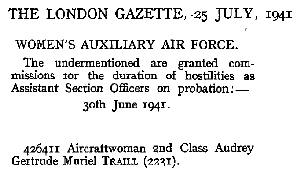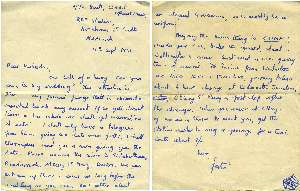 |
Gertie Traill | Page last modified: |
 |
Gertie Traill | Page last modified: |
The following are notes of 3 conversations with Gertie over Christmas (1991) & New Year, and a trascription of a tape-recording of our last talk while waiting for her flight in San Diego – she was wheelchair-bound, having suffered a stroke three years earlier.
Gertie’s trip to England: (Summary)
Gertie went off to war in 1940 aged 24. She had been living and working in BA and owned a house in Palomar (which she sold in the 1950s). She paid her own passage in third class, as her father had refused to pay, not wanting her to go. Since there were only only 25-30 passengers the captain took pity on her and moved her up to join the other volunteers for the war. There was only one other woman passenger. George Hall was one of the volunteers.Radio bunker:
Beneath the chicken run/house at the back of her uncle Frank’s garden, the English Army dug a bunker and installed a radio which she and her uncle were trained to operate should England be invaded. It was believed that as a doctor, Frank would be able to move about the village without too much interference from the invaders. [Dr. Frank Sidebotham was married to Gertie’s aunt Agnes Traill, they lived in Ottery St Mary, Devon.]Quoting from the British Resistance Archive website (Dec.2020):
“The dugout was concealed below a hen house (others report a hay stack or a Dutch Barn) in fields behind Bendarroch House, West Hill. The aerial went up a massive Wellingtonia tree. This field has now been built on and is now Windmill Lane. The aerial cable ran underground from the dugout to the Wellingtonia tree that remains on the boundary of two gardens. No evidence remains of the cable.
Ann (nee Sidebotham, daughter of Frank) remembered the location was camouflaged by its situation beneath a hen house in a field behind Bendarroch and occupied a small underground room. About 6 ft square, it was reached by a ladder from ground level. Dr Jimmy Sidebotham (son of Frank) remembered the army fixing an aerial to the tallest tree in the area and excavating a deep bunker under a hay stack. They installed what was quite a sophisticated wireless system for its time. The Wellingtonia tree that housed the aerial from the dugout still stands.”Hedge-Hopping: (Summary)
Johnny Johnson, the famous bomber pilot, once took Gertie up on a hedge hopping ride. She sat right up front in the front-gunner’s seat.Gerry Pryor: (Summary)
Gerry flew Blenheims, obsolete planes, very slow and easily torn to shreds by the enemy. They carried a crew of three: pilot, bomb-aimer, and gunner. Based in North Africa, Jerry was shot down over the Mediterranean. According to Gertie he should have been decorated for making the ultimate sacrifice: he guided his demolished plane into an enemy ship.She had seen Gerry in London. He had a scar on his forehead, much like Malcolm’s, obtained when his head hit the instrument panel as a result of a crash-landing. Afraid of being trapped in a burning wreck, Gerry had undone his safety-belt before hitting the ground. Apparently, this was standard practice, so when Gertie met Malcolm after the war she knew immediately where his scar came from.
WAAF & George Hall:
(Conversation tape-recorded at San Diego airport, 17 Jan.’92, while waiting for Gertie’s flight to Orlando. P - Peter (son), G - Gertie.)
P- What was George's father's ship?
G- Avenger.
P- Avenger?
G- You remember the North African Landings, in 42, end of 42, when the Americans came over?
P- Not ... Well I know they came over about then.
G- Yeah. Well, he was on that. He was shifting... his ship was looking after those landings and landings in the Mediterranean, you know, Oran and that side.
P- Right.
G- Then after, a week later, he was taken off it. His ship... and all the other battleships - warships too - went off to Gibraltar and from there they were sent to England. Er... um.... In the Bay of Biscay a submarine got his ship.
P- On the Bay of Biscay?
G- On the way back to England.
P- What was he?
G- He was something to do with flying control...
P- Flying control? What was the Avenger then?
G- Aircraft carrier.
P- Oh ... it was an aircraft carrier? I didn't know it was an aircraft carrier.
G- Yes. It was one of the little ones. What they called the Woolworth aircraft carriers.
P- The what? Woolworth?
G- Woolworth.
P- Woolworth ... Why, they got them at Woolworth’s?
G- They weren’t big aircraft carriers. They were merchant ships - modified.
P- Oh ....
G- And they blew up very easily. When the Avenger was hit it just blew up. Now another one of that same class, called Dasher, blew up in harbour - Liverpool. Caused terrific loss of life. I mean they were absolutely unsafe ships. Not that I knew that at the time, but I knew afterwards.
P- So he was... But he was officer rank, wasn't he?
G- Oh yes. He was a lieutenant.
P- But he went over with you on the ship .... ?
G- From the Argentine. Yes.
P- What was the name of that ship? .... Can't remember?
G- Either the Highland Princess or the Highland Bo ... mber(?). One or the other.
P- Oh, one of the Highland boats.
G- Yes.
P- Wasn’t that the Blue Star Line?
G- No. The Blue Star Line were something else... Blue Star was Royal Mail.
P- And that was in 40 .... ?
G- And... I went on the Highland boat. Not the Blue Star. Most times .... (Germans?) .... those ships. Because they were carrying meat, potatoes, all that sort of thing to England.
P- They were filled with food.
G- Stuffed to their eyebrows with food.
P- So George was born after his father died.
G- Yup. George was killed on the fifteenth of November, I got the news on the twenty-sixth, and George was born on the third of December.
P- Jeees...
G- Not a very .... (Christmas?)
P- What a shame.
P- But by that time you had left the WAAF, right? You were living...
G- Oh Lord, yes. I had to. About August. I stayed as late as I could. I hated to leave my job. It ... (a very important?) job.
P- What was it you did?
G- Well ... The official designation was intelligence operations. But actually I was purely ops. And the (emps?) was handled by the men. Because I mean... the station commander used us in the operations room - there were four or five of us who were qualified - as his personal staff. Every one of us was supposed to be able to look after the station in the event of an emergency. If we were attacked... in the air and that sort of thing... talking and get... And when if... And then we would give permission or deny permission to aircraft to take off... Get on flying control and say “so-and-so is not to take off” or “bring this chap in”. And one time I told one aircraft... Anyway, after the Thousand Bomber Raid we were supposed to be one of the most efficient stations on the east coast.
P- So where were you stationed?
G- East Anglia. Norwich. And the... all wounded - damaged aircraft - were making for us. They were crashing all around us. On the - the aircraft - on the landing ground, which was grass, and all around us, and I had a list of doctors who had offered to help. I just started at the top and went down. The station doctor had to stay on the station. You could never send him off. The two squadron... I had already sent out the two squadron doctors, different crashes. Our police would ring up and would say, in that deep drawling voice (Gertie here imitates a long drawled out male voice): “An aircraft has crashed, ma'am,” and would give where it was. And I would just go down the list, and... There were seven doctors. And every single one of them rang up and said “I have finished that job. Have you any more work for me?” This was all at two at night. Later. Yes, in the operations room we had been seventy-two hours on duty.
P- That time?
G- That time. The station commander rushing around giving us pills to keep us awake.
P- When ummm... When you had George, what, you were down in Ottery Saint Mary then, or whatever it is.
G- Oh, yes, yes. I left in August and went straight to Aunty Agnes [Sidebotham]. And had George in her house. Frank’s house.
P- Huh ... Did your uncle or...
G- Frank? No his partner, Teddy Micklem, who was a child specialist. He... he delivered George. Uncle Frank in attendance.
P- You could call it en familia.
G- Yes...
W.A.A.F. |
||

Promoted 30 June, 1941, to: |
Radio operator |
|
Letters |
||

Gertie’s Invitation to Malcolm Benitz |
A/S/O. Traill, W.A.A.F. Officers Mess, Dear Malcolm, Sidebotham: Gertie’s aunt Agnes & Dr. Frank S. |
Anyway the main thing is COME! Murder your C.O., bribe the guard, steal a Wellington & come. Just send a wire giving time of arrival. Love, |
© Peter Benitz (Benitz Family)